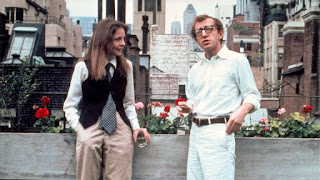Annie Hall is a 1977 American romantic
comedy film written and directed by Woody Allen. It is a film with so much to
take in that it appeals for undivided attention so much so that even a slight distraction
would leave the audience straying off the path.
In the first place, the movie is
characterized by a copious use of dialogues. Everyone everywhere seems to be
talking. Quickness characterizes the way people talk. This, indicating the
quick change of time and place as well as people’s mood, can be confusing at
times. The audience have to pay full attention to the dialogues to get the
right message. And very often two persons are heard speaking at the same time,
their words overlapping. More than once the subtitles show both the words on
their minds and the actual words being spoken. Imagine the confusion!.
Split scenes are used a few times. At one
shot Alvin and Annie are seen at different settings, displayed side by side,
each discussing with his own therapist. It is thus apparent that they are both
bothered by the same problem though they refuse to confide it to each other.
Similarly, split scenes are used to compare Annie’s family with Alvin’s when
discussing a situation common to both. If I am to watch the film for the second
time, it would be to listen to the dialogues again for better enjoyment and
understanding.
His career as a stand -up comedian is
another interesting detail. Why has he been assigned this career? Not much
stress is placed on the two cases in which he is sharing a joke on stage. The script
he uses is too short to spark laughter though the audience seem to be enjoying it
a lot. As I see it, it is in real life that he impresses the audience as a
comedian. His humour, rightly deemed a kind of neurotic humour, using his
frailties as fodder to make us laugh, is implied in the way he interacts with
the people around him. One example is his annoyance at a guy talking
incessantly behind him in a waiting queue. This causes bursts of laughter
especially when he purposely brings the guy to the presence of the man who was
his target of criticism. And Alvin may suddenly turn to speak to the camera or
even ask the strangers on the street questions about the nature of love. The
situation could very well be likened to his stage performance initiating responses
from the audience.
The audience may wonder why Alvin has been seeking the psychiatrist’s advice for fifteen years. One detail associated with his childhood may be part of the reason. He caused trouble in class because of his innocent sexual curiosity. He also irritated his mother with his indulgence in fanciful thoughts about the universe. Now a grown-up, he still finds this behaviour of his well justified. Could this be the reason for his need for psychological advice?
In view of the name of the film, one would
expect the main part of the story to evolve through the life of Annie. But as I
see it, Alvin, instead, is the focus of the story. He appears in practically
every scene. Conversely, Annie is hardly seen without Alvin. In fact, she is
framed through Alvin's experiences. Little importance is attached even to her
being with Tony Lacey, her record producer. Her part in the film, from my point of view, is
merely to show that she is the most outstanding among the women Alvin has got
along with as she is the only one to whom he proposes for marriage. Why is the
movie not named Alvin instead?
Frankly
speaking, to write a good review of the film “Annie Hall”, I would need to view
it for the second, or even the third time, to support my analysis with well
digested details. Nevertheless, the film is worth watching more than once just for its own sake.

沒有留言:
張貼留言